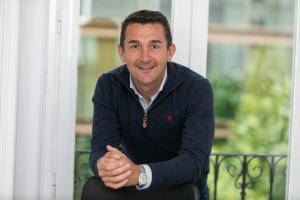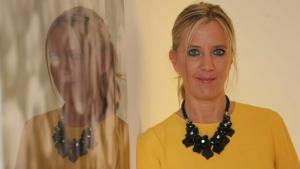David Busto: "Every existential crisis is caused by self-sabotage"
Not all types of psychological discomfort are based on sadness, fear or other emotions capable of making us feel intense experiences.
Sometimes, what makes us feel bad is precisely the inability to connect with our emotional side and with everything that can motivate us. In situations like this, it is common for what is known as an existential crisis, a phenomenon that we will talk about with coach David Busto.
- Related article: "Existential crisis: when we do not find meaning in our lives"
Interview with David Busto: How can a coach help a person in a moment of existential crisis?
David Busto Caviedes is a coach specialized in personal and financial development based in Denia, Alicante. In his support services for adults and adolescents, he frequently intervenes in problems such as low self-esteem, difficulties self-motivate and manage time, poor regulation of stress, and of course, existential crises, a relatively common form of malaise that leads to a feeling of stagnation in life. In this interview, he tells us about the way in which coaching is applied in these cases.
From your point of view, what are the main characteristics of an existential crisis?
In my experience, people enter an existential crisis when we have the feeling that what we have been doing up to now is no longer working for us, does not make sense or we simply realize that the path we have taken so far is not leading us to a place where we feel right.
Is it common for people to enter into a dynamic of self-sabotaging in the face of an existential crisis, and make it last longer than necessary?
I would say that every existential crisis is caused by self-sabotage, in the sense that we are limiting ourselves with destructive thoughts and a poor self-image of ourselves.
None of this is true, because we all have tremendous potential waiting to be awakened, however, it is necessary to remove some layers of negativity and bad habits, in addition to releasing blocked emotions that make our energy very short. Once that is done, the crisis becomes an opportunity and it is possible to come out of it with an improved version of ourselves.
Some people believe that “time heals everything”. Is this true of existential crises, or is there more to it than letting the months go by?
From my point of view, if we are not evolving, we are going backwards. Therefore, expecting things to fix themselves is like thinking that if your house has a leak, just not looking at it will fix it. If we are stuck, it is very important to get out of there as soon as possible.
For this, the help of a professional I think is very appropriate because, in addition to getting us out of the jam, it will give us tools to learn to keep our vibration high, avoid getting stuck again and we will have new tools to get out fast if we get into it again jam.
Beyond the discomfort generated by an existential crisis being experienced individually, how do personal relationships with others influence it?
Relationships with others are, in my opinion, one of the keys to happiness. I think it is very necessary to surround ourselves with inspiring people, who encourage us and encourage us to achieve our dreams and goals and who also have their own goals. Someone said that we are the result of the average of the 5 people with whom we interact the most and it seems to me very correct.
It is key that we relate to people who, after being with them for a while, feel more energetic, more optimistic and with a better disposition. Unfortunately, it is usually very common that, who falls into an existential crisis, has no one with whom share your experience and less who helps you connect with the necessary motivation to get out of she. That role can be temporarily filled by a professional who is passionate about what they do and can help the person in crisis regain the will and strength to get out of the situation.
What are the main stages of the process of turning the page and overcoming these crises?
We could talk about four phases.
A first phase in which one does not know that one does not know, that is, one is in crisis (or in the process of entering it) but still does not know it. Perhaps a shocking event such as a job loss or the end of a relationship causes the person to begin to realize that they need to change.
A second phase in which one knows that he does not know, that is, the person realizes that there are things that he is not doing in the best way. It is at this stage that professional help is usually sought.
A third stage in which one begins to learn new ways of thinking, of relating to their emotions and to others, to become aware of their potential, to feel more secure and to acquire new habits that make them feel much better. This is the stage in which the process with the professional is developing. It needs to last long enough for new learning to take hold.
A fourth and final stage where learning is integrated and done unconsciously. The person automatically does what feels good to him, has a good relationship with himself, focuses on solutions, looks at the difficulties as challenges, he has a good internal dialogue, he pays attention to what he wants and not what he fears and, in general, he feeds what is good for him in a automatic.
How are these people supported through coaching?
The support that I like to provide is based on three main aspects.
First of all, it is necessary to realize what one is doing and how one is doing it (which is a much better question than “why are you doing it”). Basically, we seek an awareness without guilt and with responsibility, that is, with the ability to respond in a better way. For this I like to use Gestalt and meditation techniques to help create a more attentive and prejudice-free internal observer.
Another important issue is to release emotions and mental, physical and energetic blocks that keep our body stiff, our mind fixed on the same old and our energy Under minimum. Bioenergetic Analysis exercises (commonly known as bioenergetics) are very appropriate for this.
Finally, it is important to learn a new way of thinking and relating to one's own emotions. We are creators of our reality. It is essential to learn to focus our attention on what we want to attract using our emotions as a guide. The objective of coaching is for the person to be independent and autonomous, although this does not stop giving support after the process is finished. For this I recommend 3 main tools.
Good reading: I personally have a long list of books that I usually recommend, among which I highlight: "Living without masks" by Susan Thesenga, "Bioenergetics" by Alexander Lowen, “27 Characters in Search of Being” by Claudio Naranjo, “See You at the Summit” by Zig Ziglar, “Ask and It Shall Be Given” by Abraham Hicks and “You Can Heal Your Life” by Louise There are. I recommend reading at least one page a day, the best times being right after waking up and before going to bed. A good trick is to have books in key places such as the bedside table, the entrance of the house, next to the sofa or in the bathroom.
Listen to audios: this is a very comfortable and practical learning tool to keep our high vibration, since we can listen to audios while doing daily tasks, driving or we walk I also recommend using audio as soon as we wake up, as it helps us tune in to a good frequency. Positive affirmations from Louise Hay, Kevin Trudeau's “Your Wish Is Your Command” CDs, or the audiobooks from the list above are all great starts.
Finally, I suggest regularly attending inspirational events such as group workshops or motivational talks, as this will help us to relate to inspiring people and participate in the frequency of a group of people who are looking for growing up.



